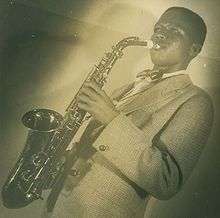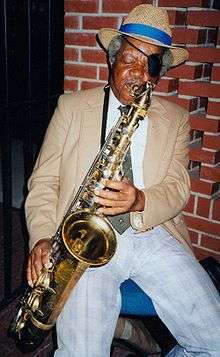Pee Wee Moore
Numa Smith "Pee Wee" Moore (March 5, 1928 in Raleigh, North Carolina – April 13, 2009) was an American jazz saxophonist.[1]



Moore attended Washington High School in Raleigh and the Hampton Institute in Virginia,[2] where he switched his major from pre-med to music after one semester. He joined the Royal Hamptonians and toured on a USO circuit. While traveling back to Hampton from New York, Pee Wee, while asleep in the backseat of his friend’s car, lost his left eye in an accident.[1]
Moore played with Lucky Millinder and Louis Jordan in 1951, and played with R&B musicians such as Wynonie Harris early in the decade. He worked with Illinois Jacquet in 1952 and James Moody in 1954-56, then played with Dizzy Gillespie in 1957, recording with him on several albums for Verve Records. He also worked with Mary Lou Williams in 1957 and Bill Doggett in 1965.[3]
Moore moved from New York back to Raleigh in the 1970s to care for his mother and recover from alcohol addiction. There, he earned a living as a handyman while playing regularly at a variety of venues in the Raleigh-Durham area.[1]
Moore has often been confused with Sol Moore, also called "Pee Wee", who also played with Dizzy Gillespie. This Pee Wee Moore played with the Jeter-Pillars Orchestra, recorded with Floyd Ray late in the 1930s, and worked with Gillespie in the Les Hite big band in 1939-42 before recording with Gilliespie's ensemble in 1946-47.[1]
Discography
With Dizzy Gillespie
- Dizzy Gillespie at Newport (Verve, 1957)
- The Greatest Trumpet of Them All (Verve, 1957)
With James Moody
- Moodsville (EmArcy, 1952)
- Moody (Prestige, 1954) also released as Moody's Workshop
- James Moody's Moods (Prestige, 1954–55)
- Hi Fi Party (Prestige, 1955)
- Wail, Moody, Wail (Prestige, 1955)
- Flute 'n the Blues (Argo, 1956)
- Moody's Mood for Love (Argo, 1956)
References
- Zagier, Alan Scher. News and Observer (Durham, NC). "Jazzman doesn’t sing the blues." 2/22/1999
- "Guide to the Pee Wee Moore Papers, 1945-2009". David M. Rubenstein Rare Book & Manuscript Library. Retrieved 2020-05-25.
- Barry Kernfeld, "Pee Wee Moore". Grove Jazz online.
External links
- Images from the Pee Wee Moore Memorial Concert (June 2009) in Flickr
- Jazz Archive at Duke University
- Pee Wee Moore Papers, Rubenstein Rare Book and Manuscript Library, Duke University